Note: these spoons are sterling silver. A much more common set of these spoons is also available in silver plate.
I believe that the manufacturer of these spoons is Toshikane, but they are only marked "sterling Tokyo".
I am not sure of the material used to make these 'gods'. It could be a type of porcelain or it could be some type of plastic alloy. In any case there is a hole drilled into the bottom of each figure and the silver stem is inserted and glued into that hole. Each figure is hand painted with considerable attention paid to detail.
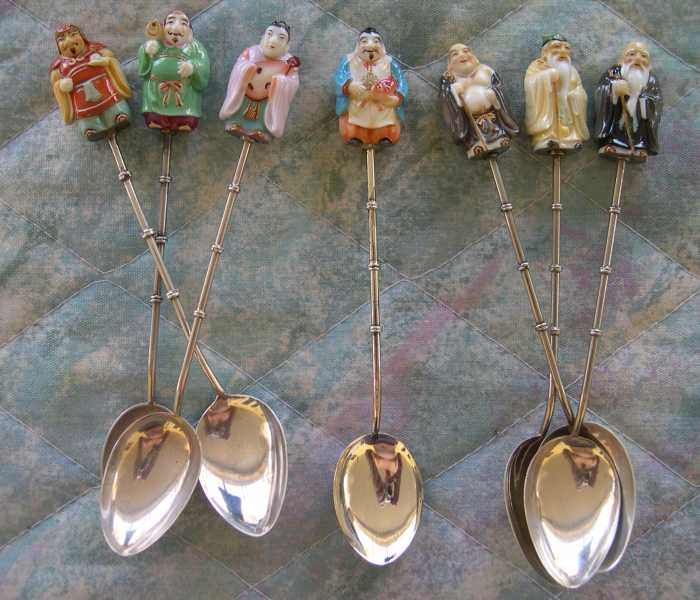
EBISU

EBISU is a native Japanese God and is said to be a real person and the son of Daikoku. Ebisu is the God of candour, wealth, good fortune and fair business practices. He is plump, has a smiling face, pointed beard and looks like Daikoku. He is usually dressed in richly brocaded, formal court garments. He carries a fishing rod and a fish called Tai, which represents plentiful food. Ebisu is the God of fishermen, rice farmers, food, management, sailors, merchants, business executives and foreigners. He grants success to people in their chosen occupations. Ebisu represents the good fortune and bounty of the sea.
DAIKOKUTEN

DAIKOKUTEN originates from the Indian God of death, Mahakala who later became the God of war; some trace his origins to one of Japan’s prehistoric rulers. He is plump, has a broad smiling face, a pointed beard and short legs and is known as the God of Wealth and Prosperity. He is dressed like a rich Chinese gentleman with a beret, carries a golden mallet and a sack full of precious objects. The patron deity of artisans, craftsmen, farmers, and millers, as well as of businessmen, bankers and financiers, he is also known as the demon chaser. Daikoku, also known as Daikokuten brings good fortune and prosperity to those who believe in him.
BENZAITEN
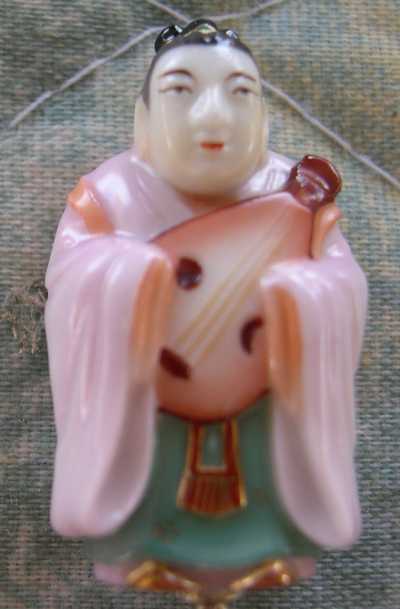
BENZAITEN (Benten) originates from the Indian Goddess Sarasvati, known as the Goddess of music, fine arts, eloquence, literature, She is the only woman among the seven Gods of fortune in Japan. She is known to be a jealous goddess. She carries a musical instrument called the Biwa and is seen with white snakes surrounding her. Benten is the goddess for performing artists, writers and dancers, painters, sculptors and gamblers. Benten represents water and is the patron of learning, music, art, and literature.
HOTEI
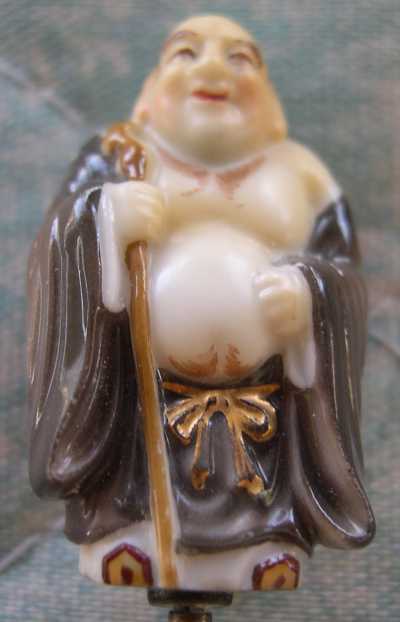
HOTEI is the incarnation of Bodhisattva Maitreya, a Zen priest belonging to China. He is based on an actual person who looked like a rogue and acted like a beggar and is popularly known as the Laughing Buddha. He is a bald, smiling man with a fat round belly, has bristly whiskers and a narrow forehead. Hotei is said to bring contentment and happiness, popularity and magnanimity. He carries a big bag, which is said to contain a never-ending supply of goods necessary for everyday living. Rubbing his nude belly is said to bring good fortune. He is the God of fortune, guardian of children and the patron of fortune-tellers and bartenders.
FUKUROKUJU
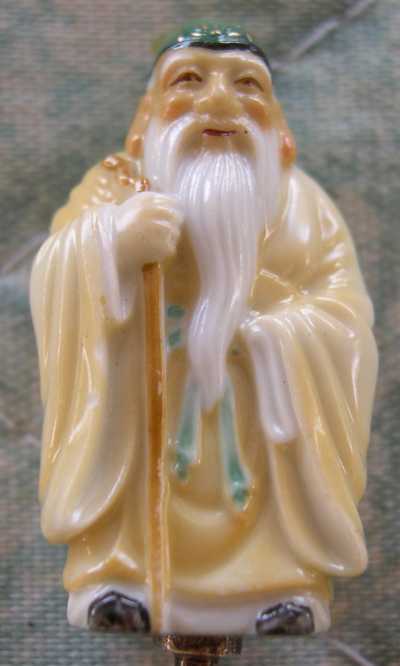
FUKUROKUJU originates from an old Chinese tale about a mythical Chinese hermit (Sung Period) who was famous because he performed miracles and was said to embody the celestial powers of the south polar star. Fuku means happiness, Roku means riches and Ju means longevity. He is the Chinese God of wisdom, happiness, wealth and long life; Fukurokuju is 3 feet tall, has a big head half his height, large eyes and a snowy, long white beard. He wears garments like those worn by ancient Chinese scholars and likes to play chess. He sometimes also has cranes and/or a tortoise near him. He is often associated with Jurojin since the two are said to inhabit the same body. He is the God of Chess players, watchmakers and athletes.
JUROJIN

JUROJIN is a Taoist (Chinese) God, the God of wisdom and it is the scroll attached to the shaku, the holy staff that he carries which is believed to contain all the wisdom of the world. He has a white beard and carries a holy staff and scroll and is seen accompanied by a deer. Jurojin is often confused with Fukurokujo because they are both said to inhabit the same body and are both shown accompanied by a deer. Funnily enough, considering he is said to be the God of wisdom, Jurojin, is said to be a heavy drunkard and known to enjoy the company of women. He is the God teachers, scientists, mathematicians and professors.
BISHAMONTEN
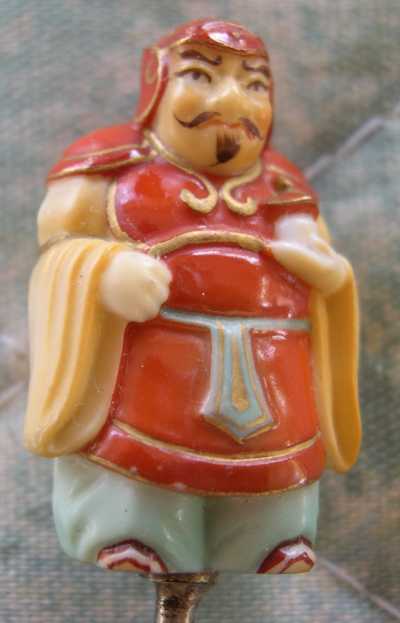
BISHAMONTEN has his origins in India, where he was known as Viasravana, he is a Buddhist missionary , mistakenly called the god of war, probably because of his physical appearance which is taken literally. He wears an armour and helmet, carries a halberd in defence of faith and as a guard against all that is harmful. He is tall, has a bushy beard, carries a tower in one hand signifying faith and treasure; the pigeon is his messenger. He is the God for doctors, soldiers and priests. Bishamon-ten, is usually portrayed with a severe countenance in order to keep everything evil away. He is worshipped as the God of dignity and the harbinger of good fortune, wealth, happiness, righteousness and religious faith.
Technically six of these Gods originated elsewhere.
Three are from India (Daikokuten, Bishamonten, and Benzaiten) and three from China (Hotei, Jurojin, and Fukurokuju).
Only Ebisu originated in Japan.
The information on this page was obtained from: http://www.asianartmall.com/7luckygodsarticle.htm
More Japanese porcelain finial spoons may be seen by clicking here
Return to spoon exhibits index